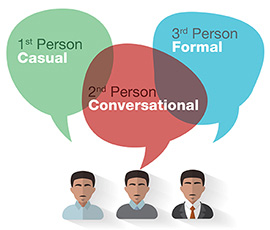Which Voice or Point of View is Right for Your Website?


"I've been thinking about our voice," said Lance Lawyer, standing in the doorway of his sister Linda's office at L & L Law.
"What's wrong with your voice?" she asked, "It sounds fine to me."
"Not that voice," answered Lance, "our website and blog voice. Which voice or point of view should we use for different parts of the website? I think it makes a difference in how readers experience our site and blog."
What is Voice or Point of View?
Point of view, or voice, in writing is the perspective the writer takes to tell the story. It is the mode of narration used to inform your clients or prospective clients. There are three points of view:
- First Person: I, me, we, us, our
- Second Person: you, yours
- Third Person: he, she, him, her, they, it
Same Sentence, Different Points of View
First person: I like to read cozy mysteries.
Second person: You will like to read cozy mysteries.
Third person: Many people like to read cozy mysteries.
First person is the most personal of the three points of view. Using "I" or "we" creates a feeling of trust with your readers because the text is read as if it comes straight from you. It helps potential clients connect with you, provides a sense of your personality, makes content sound honest, and reveals your character while demonstrating your expertise and authority.
When to Use First Person
Use first person when you want to create trust and express your personality. It is useful for your profile where you can talk about your journey to the law, your education, your area of practice, and how you can help clients. When talking about your firm, be careful using "we" if, in reality, you are the only one in the office. Conversely, if clients will interact with staff more than you will, say so to avoid unclear expectations.
Second person implies that the reader is involved in the conversation. You are speaking directly to the reader as I am speaking to you now. With second person, it is easier to persuade the reader to take action.
When to Use Second Person
It is a good choice for instructing and informing in a conversational tone. It works well on Q&A sections, informative articles, and can help you demonstrate expertise while staying approachable. Lawyers often intimidate consumers, and this point of view helps them connect with what you are writing while not scaring them away. Blog posts are best when written in second person.
Third person is the most formal of the three points of view. It implies professionalism and places the writer as someone outside of the conversation. News articles are informative and written in third person, while opinion pieces are written in first person.
When to Use Third Person
You can use third person to present unbiased information, for example, when describing the parts of a will or contract. Third person can work well when answering questions and for press releases.
For your marketing campaign to succeed, the content must connect with your visitors. Being aware of the uses of the three points of view will go a long way to achieving your goals.
 Roberta Gubbins has served as the editor of the Ingham County Legal News. Since leaving the paper, she provides services as a ghostwriter editing articles, blogs, and e-blasts for lawyers and law firms. She is the editor of Briefs, the Ingham County Bar Association e-newsletter, and The Mentor, SBM Master Lawyers Section newsletter.
Roberta Gubbins has served as the editor of the Ingham County Legal News. Since leaving the paper, she provides services as a ghostwriter editing articles, blogs, and e-blasts for lawyers and law firms. She is the editor of Briefs, the Ingham County Bar Association e-newsletter, and The Mentor, SBM Master Lawyers Section newsletter.
Read More Clear & Convincing Articles
Using the New Enhanced Member Directory
How to Login and Edit Your Profile
Zeekbeek For Lawyers Page—learn about all the new directory features
How to Contact ZeekBeek Support